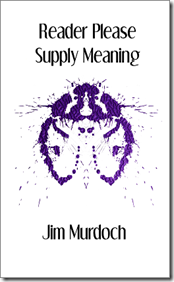![Reader272x400 Reader272x400]() Poems
Poems
Poems are near
naked thoughts: for
we will not take
off our clothes since
we are ashamed
of our bodies.
7 January 1979
‘Poems’ was first published in First Time #18 in 1990. It is the first poem in my new collection Reader Please Supply Meaning. It is also the first poem I ever wrote about poetry. A lot of people look down on poems about poems. I’ve never understood this; poetry fascinates me.
Over five hundred poems later, in poem #1064 ‘Subcutaneousness’, I wrote:
Poems are flat.
Poetry’s not.
What do I mean by that? A poem is an artificial construct. A photograph isn’t real life. It looks real enough but it’s only an agglomeration of pixels. It suggests reality. At best it’s a subset of reality. Likewise a poem is not poetry. It is a sequence of letters. (Let’s not complicate matters by bringing in visual poetry here.)
I eschew all romantic notions of poetry but poetry—if you like poetry-with-a-capital-p—is, to my mind, a kind of meaning. A poem is an attempt to transcribe part of this “meaning” into words and, as such, is doomed to fail; words are poor containers for meaning. What is meaning anyway? It’s one of those words we chuck around—like poetry—without really having a handle on what it… well, what it means. What does someone mean when they say that something “means something” to them? They can never put this something into words or, if they try, whatever it is finds itself somehow diminished in the process. Often that “meaning” is sentimental attachment and that’s almost as hard to explain.
Sentiment. What does it even mean? Well, one meaning—dare I say its primary meaning?—is: an attitude, thought, or judgment prompted by feeling. Seems like not a bad definition of how poetry works because I suspect all poetry begins with feelings, get translated into thoughts (and, of course, much is lost in the translation) and then it finds its way back into feelings again. Poems are therefore filters. You could say they refine. Perhaps they dilute. They no longer mean; they suggest.
Reginald Shepherd wrote:
I am not interested in the poem as a record of experience; I’m interested in the poem as an experience in itself.
I concur. There is an old adage, attributed to Heraclitus, which goes something like: You could not step twice into the same river. Two men cannot step once into the same river. Experience is unique to every individual. So although it’s not wrong to talk about reading a poem the verb falls short of what’s going on here: we experience poetry. At least that’s what the goal is. Anyone can read a poem—it’s merely a string of words on a page—but not everyone will connect with it. Am I making sense?
For nearly forty years I’ve wondered about this process. What happens when we read a poem? What do we expect is going to happen? Over the next few weeks and months I’ll post some of the poems from Reader Please Supply Meaning. It’s a project that’s ongoing. Maybe I’ll publish an expanded version in twenty years. Maybe I’ll have poetry sussed by then. At the moment the collection contains about a hundred poems in chronological order and with an introductory essay which you can read in full on my website here along with a handful of poems from the book.
You can buy the book here for the very reasonable price of £5.99 (including postage) if you live in the UK.
And if you need any encouragement this is what my wife said to me about the book—this, you must understand, is the woman who on reading a novel I’d slaved over for four years said it was “good” (so not someone given to hyperbole)—“You watch [the poems] progress until they’re almost too good for words.” She made me write that down. I can probably die happy now.
